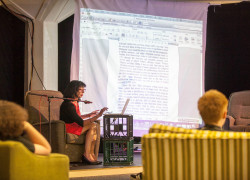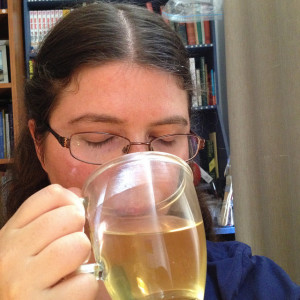
Canberra has a vibrant literary community, as demonstrated by attendance at the Noted and You Are Here festivals. However, opportunities for Indigenous writers are sadly lacking. So argued Dr Jeanine Leane in the second instalment of (I Hate You) For Sentimental Reasons, a series devoted to examining the shortcomings of Canberra’s art scene.
The audience settled in on the cosy couches of The Record Store for the presentation but the topic was anything but cosy. Indeed, it seemed that the Canberra art scene didn’t care to hear about its shortcomings, with a disappointing drop in audience numbers after the previous instalment (Ask Me Anything with publisher Lex Hirst).
Dr Leane began with an acknowledgement of the Ngunnawal people – the traditional custodians of the land on which the talk took place. Her Wiradjuri ancestors and the Torres Strait Islanders were present in the audience. She then gave a short history of publications by Indigenous writers, pointing out that it was indeed short. The first Aboriginal writer to be published was David Uniapon in 1925, though some of his work wasn’t correctly attributed to his name until 2006. However, the publication of works by Indigenous writers remained relatively uncommon until a proliferation in the late 80s.
The talk quite literally became a list of names at this point, as Dr Leane’s speaking notes were projected onto a screen for the duration of the presentation. Although this had the potential to be dull, it proved useful, allowing the audience to gather the correct spelling for author names and helping them to negotiate a dense topic.
With activism hitting heights in 1988 in response to the centenary of white settlement, the David Uniapon Award for unpublished Indigenous writers was established in Queensland. This made, and continues to make, Queensland Australia’s foremost state in terms of opportunities for Indigenous writers. In contrast, the ACT Literary Awards has no specific category for Indigenous writers. Dr Leane argued this was needed because of the lack of venues for Indigenous writing. Topics concerning Indigenous writers, such as deaths in police custody, are unpalatable to mainstream markets or are filtered to make them so.
She concluded by sharing a poem she had written that had been turned down by the Canberra Times and was instead accepted by Antipodes, a well-respected US journal on Australian literary studies.
While a broader discussion of Canberra’s lack of opportunities for Indigenous writers and potential solutions may have been beneficial, Dr Leane made excellent use of the brief time available by keeping focused on the issue of literary awards, internships and mentorships. The national and historical context she gave allowed greater insight into why the lack of initiatives supporting Indigenous writers in the ACT is a dire shortcoming of Canberra’s art scene.
– by Elizabeth Fitzgerald
(Photo credit: Adam Thomas)
 Elizabeth Fitzgerald is a freelance editor and owner of Earl Grey Editing. She is a committee member of the Canberra Speculative Fiction Guild and served as Secretary in 2011 and 2012. She also previously ran their novel critiquing circle. Her short stories have been published in Burley, Issue #2and the CSFG anthology Next, and she has had poetry published in FIRST in 2005, 2006 and 2008. Her weaknesses are books, loose-leaf tea and silly dogs. She tweets @elizabeth_fitz
Elizabeth Fitzgerald is a freelance editor and owner of Earl Grey Editing. She is a committee member of the Canberra Speculative Fiction Guild and served as Secretary in 2011 and 2012. She also previously ran their novel critiquing circle. Her short stories have been published in Burley, Issue #2and the CSFG anthology Next, and she has had poetry published in FIRST in 2005, 2006 and 2008. Her weaknesses are books, loose-leaf tea and silly dogs. She tweets @elizabeth_fitz

